
Treatment Furniture
-
 Ambulation Training
Ambulation Training
-
 CanDo Treatment Furniture
CanDo Treatment Furniture
-
 Exam Lamps
Exam Lamps
-
 Foot Stools
Foot Stools
-
 Mirrors
Mirrors
-
 Platform Tables
Platform Tables
-
 Exam Table Paper
Exam Table Paper
-
 Privacy Screens
Privacy Screens
-
 Seating
Seating
-
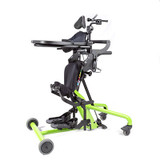 Standing Tables
Standing Tables
-
 Tilt Tables
Tilt Tables
-
 Treatment Tables
Treatment Tables
-
 Work Tables
Work Tables
-

Accessory for EasyStand - Positioning Belt w/Airline Style Buckle
EasyStand
Retail: $172.50$130.38The EasyStand Positioning Belt provides hip stability with the security of an airline style buckle. Fits hip circumference of 26"-55" (66-140cm). This is an optional add-on to the EasyStand Evolv Large, the contoured back is required to have this option.66-0065Retail: $172.50$130.38 -

Accessory for EasyStand - Positioning Cushion - Contoured Back 15" H
EasyStand
Retail: $812.50$621.56The EasyStand - Positioning Cushion has a contoured back for a more comfortable fit. The top of back is 15" (38cm) from seat. This is an optional add-on to the EasyStand Evolv Large.66-0064Retail: $812.50$621.56 -

EasyStand Evolv Large
EasyStand
Retail: $2,450.00$1,852.38The EasyStand Evolv Large is a standing frame that provides a safe, supportive and comfortable transition from sitting to standing. The optimal standing position has been perfected in the Evolv standing frame. By strategically placing the pivot points of...66-0062Retail: $2,450.00$1,852.38 -
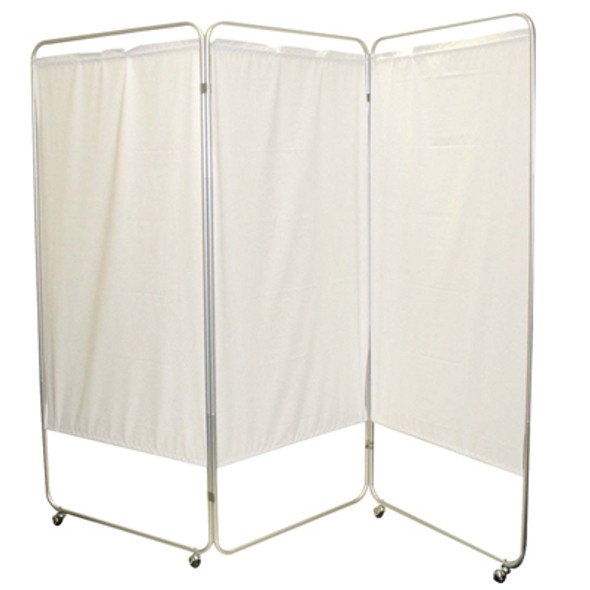
King size 3-Panel Privacy Screen with casters - Yellow 4 mil vinyl, 85" W x 68" H extended, 31" W x 68" H x2.5" D folded
Presco Webber
$325.00The foldable privacy screens are lightweight and easy to position and store. Privacy screens are available with or without casters. The privacy screen panels are fire-resistant and easy to clean. Available in white 6 mil, green 6 mil, or yellow 4 mil.65-0131Y$325.00 -

King size 3-Panel Privacy Screen with casters - White 6 mil vinyl, 85" W x 68" H extended, 31" W x 68" H x2.5" D folded
Presco Webber
$325.00The foldable privacy screens are lightweight and easy to position and store. Privacy screens are available with or without casters. The privacy screen panels are fire-resistant and easy to clean. Available in white 6 mil, green 6 mil, or yellow 4 mil.65-0131W$325.00 -

King size 3-Panel Privacy Screen with casters - Green 6 mil vinyl, 85" W x 68" H extended, 31" W x 68" H x2.5" D folded
Presco Webber
$325.00The foldable privacy screens are lightweight and easy to position and store. Privacy screens are available with or without casters. The privacy screen panels are fire-resistant and easy to clean. Available in white 6 mil, green 6 mil, or yellow 4 mil.65-0131G$325.00 -

King size 4-Panel Privacy Screen - Yellow 4 mil vinyl, 113" W x 68" H extended, 31" W x 68" H x3.25" D folded
Presco Webber
$392.50The foldable privacy screens are lightweight and easy to position and store. Privacy screens are available with or without casters. The privacy screen panels are fire-resistant and easy to clean. Available in white 6 mil, green 6 mil, or yellow 4 mil.65-0122Y$392.50 -

King size 4-Panel Privacy Screen - White 6 mil vinyl, 113" W x 68" H extended, 31" W x 68" H x3.25" D folded
Presco Webber
$392.50The foldable privacy screens are lightweight and easy to position and store. Privacy screens are available with or without casters. The privacy screen panels are fire-resistant and easy to clean. Available in white 6 mil, green 6 mil, or yellow 4 mil.65-0122W$392.50 -

King size 4-Panel Privacy Screen - Green 6 mil vinyl, 113" W x 68" H extended, 31" W x 68" H x3.25" D folded
Presco Webber
$392.50The foldable privacy screens are lightweight and easy to position and store. Privacy screens are available with or without casters. The privacy screen panels are fire-resistant and easy to clean. Available in white 6 mil, green 6 mil, or yellow 4 mil.65-0122G$392.50 -

King size 3-Panel Privacy Screen - Yellow 4 mil vinyl, 85" W x 68" H extended, 31" W x 68" H x2.5" D folded
Presco Webber
$292.50The foldable privacy screens are lightweight and easy to position and store. Privacy screens are available with or without casters. The privacy screen panels are fire-resistant and easy to clean. Available in white 6 mil, green 6 mil, or yellow 4 mil.65-0121Y$292.50 -
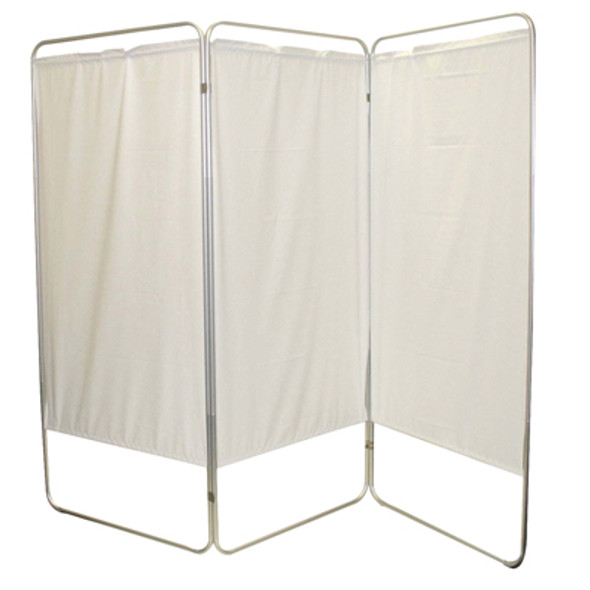
King size 3-Panel Privacy Screen - White 6 mil vinyl, 85" W x 68" H extended, 31" W x 68" H x2.5" D folded
Presco Webber
$292.50The foldable privacy screens are lightweight and easy to position and store. Privacy screens are available with or without casters. The privacy screen panels are fire-resistant and easy to clean. Available in white 6 mil, green 6 mil, or yellow 4 mil.65-0121W$292.50 -
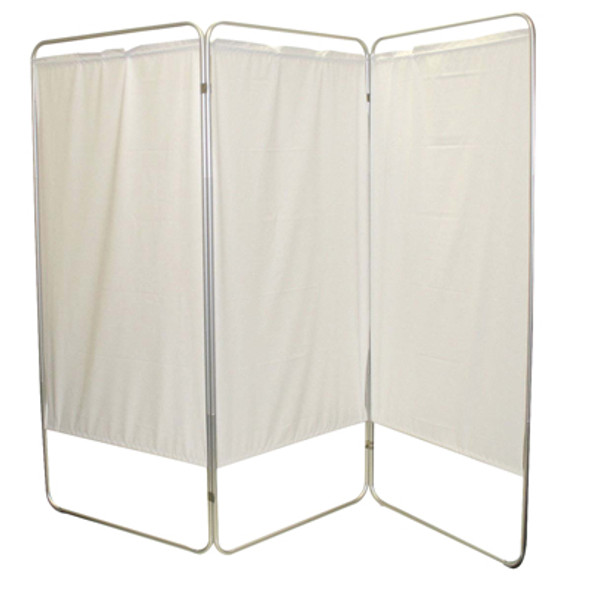
King size 3-Panel Privacy Screen - Green 6 mil vinyl, 85" W x 68" H extended, 31" W x 68" H x2.5" D folded
Presco Webber
$292.50The foldable privacy screens are lightweight and easy to position and store. Privacy screens are available with or without casters. The privacy screen panels are fire-resistant and easy to clean. Available in white 6 mil, green 6 mil, or yellow 4 mil.65-0121G$292.50 -

King size 2-Panel Privacy Screen - Yellow 4 mil vinyl, 69" W x 68" H extended, 31" W x 68" H x1.5" D folded
Presco Webber
$250.00The foldable privacy screens are lightweight and easy to position and store. Privacy screens are available with or without casters. The privacy screen panels are fire-resistant and easy to clean. Available in white 6 mil, green 6 mil, or yellow 4 mil.65-0120Y$250.00 -

King size 2-Panel Privacy Screen - White 6 mil vinyl, 69" W x 68" H extended, 31" W x 68" H x1.5" D folded
Presco Webber
$250.00The foldable privacy screens are lightweight and easy to position and store. Privacy screens are available with or without casters. The privacy screen panels are fire-resistant and easy to clean. Available in white 6 mil, green 6 mil, or yellow 4 mil.65-0120W$250.00 -

King size 2-Panel Privacy Screen - Green 6 mil vinyl, 59" W x 68" H extended, 31" W x 68" H x1.5" D folded
Presco Webber
$250.00The foldable privacy screens are lightweight and easy to position and store. Privacy screens are available with or without casters. The privacy screen panels are fire-resistant and easy to clean. Available in white 6 mil, green 6 mil, or yellow 4 mil.65-0120G$250.00 -

Standard 4-Panel Privacy Screen with casters - Yellow 4 mil vinyl, 62" W x 68" H extended, 19" W x 68" H x3.25" D folded
Presco Webber
$367.50The foldable privacy screens are lightweight and easy to position and store. Privacy screens are available with or without casters. The privacy screen panels are fire-resistant and easy to clean. Available in white 6 mil, green 6 mil, or yellow 4 mil.65-0111Y$367.50 -

Standard 4-Panel Privacy Screen with casters - White 6 mil vinyl, 62" W x 68" H extended, 19" W x 68" H x3.25" D folded
Presco Webber
$367.50The foldable privacy screens are lightweight and easy to position and store. Privacy screens are available with or without casters. The privacy screen panels are fire-resistant and easy to clean. Available in white 6 mil, green 6 mil, or yellow 4 mil.65-0111W$367.50 -

Standard 4-Panel Privacy Screen with casters - Green 6 mil vinyl, 62" W x 68" H extended, 19" W x 68" H x3.25" D folded
Presco Webber
$367.50The foldable privacy screens are lightweight and easy to position and store. Privacy screens are available with or without casters. The privacy screen panels are fire-resistant and easy to clean. Available in white 6 mil, green 6 mil, or yellow 4 mil.65-0111G$367.50 -

Standard 3-Panel Privacy Screen with casters - Yellow 4 mil vinyl, 48" W x 68" H extended, 19" W x 68" H x2.5" D folded
Presco Webber
$250.00The foldable privacy screens are lightweight and easy to position and store. Privacy screens are available with or without casters. The privacy screen panels are fire-resistant and easy to clean. Available in white 6 mil, green 6 mil, or yellow 4 mil.65-0110Y$250.00 -

Standard 3-Panel Privacy Screen with casters - White 6 mil vinyl, 48" W x 68" H extended, 19" W x 68" H x2.5" D folded
Drive
$250.00The foldable privacy screens are lightweight and easy to position and store. Privacy screens are available with or without casters. The privacy screen panels are fire-resistant and easy to clean. Available in white 6 mil, green 6 mil, or yellow 4 mil.65-0110W$250.00 -

Standard 3-Panel Privacy Screen with casters - Green 6 mil vinyl, 48" W x 68" H extended, 19" W x 68" H x2.5" D folded
Presco Webber
$250.00The foldable privacy screens are lightweight and easy to position and store. Privacy screens are available with or without casters. The privacy screen panels are fire-resistant and easy to clean. Available in white 6 mil, green 6 mil, or yellow 4 mil.65-0110G$250.00 -

Standard 5-Panel Privacy Screen - Yellow 4 mil vinyl, 84" W x 68" H extended, 19" W x 68" H x4" D folded
Presco Webber
$452.50The foldable privacy screens are lightweight and easy to position and store. Privacy screens are available with or without casters. The privacy screen panels are fire-resistant and easy to clean. Available in white 6 mil, green 6 mil, or yellow 4 mil.65-0103Y$452.50 -

Standard 5-Panel Privacy Screen - White 6 mil vinyl, 84" W x 68" H extended, 19" W x 68" H x4" D folded
Presco Webber
$452.50The foldable privacy screens are lightweight and easy to position and store. Privacy screens are available with or without casters. The privacy screen panels are fire-resistant and easy to clean. Available in white 6 mil, green 6 mil, or yellow 4 mil.65-0103W$452.50 -

Standard 5-Panel Privacy Screen - Green 6 mil vinyl, 84" W x 68" H extended, 19" W x 68" H x4" D folded
Presco Webber
$452.50The foldable privacy screens are lightweight and easy to position and store. Privacy screens are available with or without casters. The privacy screen panels are fire-resistant and easy to clean. Available in white 6 mil, green 6 mil, or yellow 4 mil.65-0103G$452.50 -

Standard 4-Panel Privacy Screen - Yellow 4 mil vinyl, 62" W x 68" H extended, 19" W x 68" H x3.25" D folded
Presco Webber
$325.00The foldable privacy screens are lightweight and easy to position and store. Privacy screens are available with or without casters. The privacy screen panels are fire-resistant and easy to clean. Available in white 6 mil, green 6 mil, or yellow 4 mil.65-0102Y$325.00 -

Standard 4-Panel Privacy Screen - White 6 mil vinyl, 62" W x 68" H extended, 19" W x 68" H x3.25" D folded
Presco Webber
$325.00The foldable privacy screens are lightweight and easy to position and store. Privacy screens are available with or without casters. The privacy screen panels are fire-resistant and easy to clean. Available in white 6 mil, green 6 mil, or yellow 4 mil.65-0102W$325.00 -

Standard 4-Panel Privacy Screen - Green 6 mil vinyl, 62" W x 68" H extended, 19" W x 68" H x3.25" D folded
Presco Webber
$325.00The foldable privacy screens are lightweight and easy to position and store. Privacy screens are available with or without casters. The privacy screen panels are fire-resistant and easy to clean. Available in white 6 mil, green 6 mil, or yellow 4 mil.65-0102G$325.00 -

Standard 3-Panel Privacy Screen - Yellow 4 mil vinyl, 48" W x 68" H extended, 19" W x 68" H x2.5" D folded
Presco Webber
$215.00The foldable privacy screens are lightweight and easy to position and store. Privacy screens are available with or without casters. The privacy screen panels are fire-resistant and easy to clean. Available in white 6 mil, green 6 mil, or yellow 4 mil.65-0101Y$215.00 -

Standard 3-Panel Privacy Screen - White 6 mil vinyl, 48" W x 68" H extended, 19" W x 68" H x2.5" D folded
Presco Webber
$215.00The foldable privacy screens are lightweight and easy to position and store. Privacy screens are available with or without casters. The privacy screen panels are fire-resistant and easy to clean. Available in white 6 mil, green 6 mil, or yellow 4 mil.65-0101W$215.00 -

Standard 3-Panel Privacy Screen - Green 6 mil vinyl, 48" W x 68" H extended, 19" W x 68" H x2.5" D folded
Presco Webber
$215.00The foldable privacy screens are lightweight and easy to position and store. Privacy screens are available with or without casters. The privacy screen panels are fire-resistant and easy to clean. Available in white 6 mil, green 6 mil, or yellow 4 mil.65-0101G$215.00 -

Standard 2-Panel Privacy Screen - Yellow 4 mil vinyl, 35" W x 68" H extended, 19" W x 68" H x1.5" D folded
Presco Webber
$215.00The foldable privacy screens are lightweight and easy to position and store. Privacy screens are available with or without casters. The privacy screen panels are fire-resistant and easy to clean. Available in white 6 mil, green 6 mil, or yellow 4 mil.65-0100Y$215.00 -

Standard 2-Panel Privacy Screen - White 6 mil vinyl, 35" W x 68" H extended, 19" W x 68" H x1.5" D folded
Presco Webber
$215.00The foldable privacy screens are lightweight and easy to position and store. Privacy screens are available with or without casters. The privacy screen panels are fire-resistant and easy to clean. Available in white 6 mil, green 6 mil, or yellow 4 mil.65-0100W$215.00 -

Standard 2-Panel Privacy Screen - Green 6 mil vinyl, 35" W x 68" H extended, 19" W x 68" H x1.5" D folded
Presco Webber
$215.00The foldable privacy screens are lightweight and easy to position and store. Privacy screens are available with or without casters. The privacy screen panels are fire-resistant and easy to clean. Available in white 6 mil, green 6 mil, or yellow 4 mil.65-0100G$215.00 -

Heavy Duty Bariatric Footstool with Non-Skid Rubber Platform and Handrail
Drive
$132.50The Heavy Duty Bariatric Footstool with Non-Skid Rubber Platform and Handrail allows users to safely and confidently reach higher items. Its nonslip surface and nonskid feet ensure secure use, great for items in upper cabinets or tall shelves. Plus, the...43-1901$132.50 -
Out of stock

Montane Columbia - fixed height table, 74" L x 25" W, 2-section
Montane
$730.002-section Montane Columbia fixed height table. 74" L x 25" W. 0-45 degree head tilt. High quality upholstery available in various color options. 330 lb weight capacity.35-9510$730.00 -
Out of stock

Montane Taurus Bobath - hi-low table, 79" L x 47" W, 2-section, castors
Montane
$2,775.002-section Montane Taurus Bobath hi-low table measures 79" L x 47" W. 0-85 degree head tilt. 19-48" height adjustable. System is very quiet due to magnetic switch. 4 casers with 1 central brake and lift system. High quality upholstery available in various...35-8110$2,775.00 -
Out of stock

Montane Alps - hi-low table, 79" L x 27" W, 5-section, castors
Montane
$3,725.005-section Montane Alps hi-low table. 79" L x 27" W. 70-40 degree head tilt. 0-85 degree leg tilt. Adjustable arm boards. System is very quiet due to magnetic switch. 4 casers with 1 central brake and lift system. High quality upholstery available in...35-5110$3,725.00 -
Out of stock
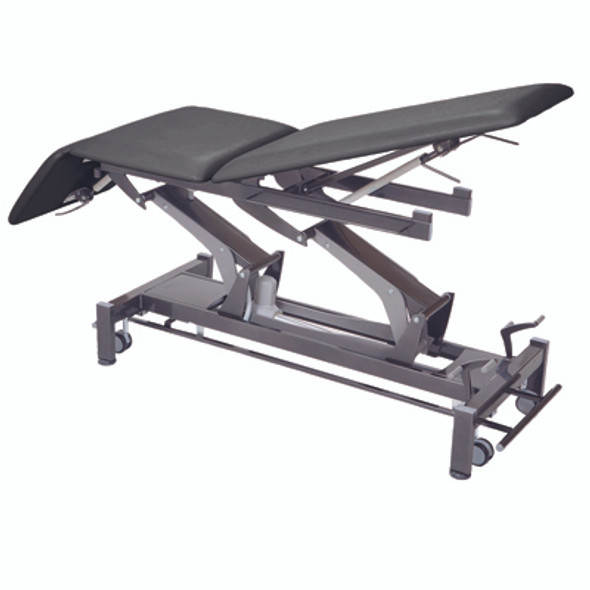
Montane Atlas - hi-low table, 79" L x 27" W, 3-section, castors
Montane
$12,300.003-section Montane Atlas hi-low table measures 79" L x 27" W. 70-40 degree head tilt. 0-85 degree leg tilt. System is very quiet due to magnetic switch. 4 casers with 1 central brake and lift system. High quality upholstery available in various color...35-3110$12,300.00 -
Out of stock

Montane Tatras - hi-low table, 79" L x 27" W, 2-section, castors
Montane
$3,075.002-section Montane Tatras hi-low table measures 79" L x 27" W. 70-40 degree head tilt. 19-48" height adjustable. System is very quiet due to magnetic switch. 4 casers with 1 central brake and lift system. High quality upholstery available in various...35-2110$3,075.00 -

Glass mirror, mobile caster base, 3-panel mirror, 22" W x 60" H
FEI
$1,650.00Child size 3-Way Mirror: Glass size 17" x 53" each panel, Overall size 22" x 60 1/2" each panel including casters. Plate glass mirrors are an invaluable aid to Physical, Speech, Occupational Therapy and Sports Medicine Departments. May be used in a...19-1113$1,650.00 -

Glass mirror, mobile caster base, vertical, 22" W x 60" H
MirrorLite
$562.50Mobile plate glass mirrors may be used in a variety of ways: in exercise and weight rooms, or with parallel bars and training stairs. Generously sized, distortion-free 1/4" plate glass mirrors are mounted in natural finish hardwood frames. Mobile units...19-1111$562.50 -

Glass mirror, wall mount, vertical, 22" W x 60" H
MirrorLite
$490.00Wall-mount plate glass mirrors may be hung vertically or horizontally. Mirrors are used in a variety of ways: in exercise and weight rooms, or with parallel bars and training stairs. Generously sized, distortion-free 1/4" plate glass mirrors are mounted...19-1110$490.00 -

Glass mirror, mobile caster base, 3-panel mirror, 28" W x 75" H
FEI
$1,875.00Adult size 3-Way Mirror: Glass size 23" x 67" each panel, Overall size 28" x 75" each panel including casters. Plate glass mirrors are an invaluable aid to Physical, Speech, Occupational Therapy and Sports Medicine Departments. May be used in a variety...19-1103$1,875.00 -

Glass mirror, mobile caster base, vertical, 28" W x 75" H
MirrorLite
$650.00Mobile plate glass mirrors may be used in a variety of ways: in exercise and weight rooms, or with parallel bars and training stairs. Generously sized, distortion-free 1/4" plate glass mirrors are mounted in natural finish hardwood frames. Mobile units...19-1101$650.00 -

Glass mirror, wall mount, vertical, 28" W x 75" H
MirrorLite
$582.50Wall-mount plate glass mirrors may be hung vertically or horizontally. Mirrors are used in a variety of ways: in exercise and weight rooms, or with parallel bars and training stairs. Generously sized, distortion-free 1/4" plate glass mirrors are mounted...19-1100$582.50 -

Glassless mirror, free-standing, double panel, 24" H x 72" H
FEI
$1,050.00Ultra-Safe glassless mirrors provide a distortion-free image with its highly optical reflective film. The film is lighter and brighter than glass mirrors and are a perfect glass alternative. These ?glassless? mirrors are shatterproof and are light in...19-1072$1,050.00 -

Glassless mirror, triple panel, 12" W x 16" H
FEI
$315.00Ultra-Safe glassless mirrors are designed for use by speech therapists and their patients. The glassless mirrors provide a distortion-free image with its highly optical reflective film. The film is lighter and brighter than glass mirrors and are a...19-1061$315.00 -

Glassless mirror, free-standing, 12" W x 16" H
MirrorLite
$330.00Ultra-Safe glassless mirrors are designed for use by speech therapists and their patients. The glassless mirrors provide a distortion-free image with its highly optical reflective film. The film is lighter and brighter than glass mirrors and are a...19-1060$330.00 -

Glassless mirror, free-standing, triple panel, 24" W x 72" H
FEI
$1,475.00Ultra-Safe glassless mirrors provide a distortion-free image with its highly optical reflective film. The film is lighter and brighter than glass mirrors and are a perfect glass alternative. These ?glassless? mirrors are shatterproof and are light in...19-1052$1,475.00 -

Glassless mirror, free-standing, triple panel, 16" W x 48" H
FEI
$877.50Ultra-Safe glassless mirrors provide a distortion-free image with its highly optical reflective film. The film is lighter and brighter than glass mirrors and are a perfect glass alternative. These ?glassless? mirrors are shatterproof and are light in...19-1051$877.50 -

Glassless mirror, mobile caster base, vertical, 60" W x 96" H
FEI
$1,200.00Ultra-Safe glassless mirrors provide a distortion-free image with its highly optical reflective film. The film is lighter and brighter than glass mirrors and are a perfect glass alternative. These ?glassless? mirrors are shatterproof and are light in...19-1045$1,200.00 -

Glassless mirror, mobile caster base, vertical, 60" W x 72" H
FEI
$1,100.00Ultra-Safe glassless mirrors provide a distortion-free image with its highly optical reflective film. The film is lighter and brighter than glass mirrors and are a perfect glass alternative. These ?glassless? mirrors are shatterproof and are light in...19-1044$1,100.00 -

Glassless mirror, stationary with stand,vertical, 60" W x 96" H
FEI
$1,100.00Ultra-Safe glassless mirrors provide a distortion-free image with its highly optical reflective film. The film is lighter and brighter than glass mirrors and are a perfect glass alternative. These ?glassless? mirrors are shatterproof and are light in...19-1043$1,100.00 -

Glassless mirror, stationary with stand, vertical, 60" W x 72" H
FEI
$1,025.00Ultra-Safe glassless mirrors provide a distortion-free image with its highly optical reflective film. The film is lighter and brighter than glass mirrors and are a perfect glass alternative. These ?glassless? mirrors are shatterproof and are light in...19-1042$1,025.00 -

Glassless mirror, wall mount, vertical, 60" W x 96" H
FEI
$942.50Ultra-Safe glassless mirrors provide a distortion-free image with its highly optical reflective film. The film is lighter and brighter than glass mirrors and are a perfect glass alternative. These ?glassless? mirrors are shatterproof and are light in...19-1041$942.50 -

Glassless mirror, wall mount, vertical, 60" W x 72" H
FEI
$847.50Ultra-Safe glassless mirrors provide a distortion-free image with its highly optical reflective film. The film is lighter and brighter than glass mirrors and are a perfect glass alternative. These ?glassless? mirrors are shatterproof and are light in...19-1040$847.50 -

Glassless mirror, wall mount, vertical, 24" W x 96" H
FEI
$530.00Ultra-Safe glassless mirrors provide a distortion-free image with its highly optical reflective film. The film is lighter and brighter than glass mirrors and are a perfect glass alternative. These ?glassless? mirrors are shatterproof and are light in...19-1038$530.00 -

Glassless mirror, wall mount, vertical, 36" W x 96" H
FEI
$660.00Ultra-Safe glassless mirrors provide a distortion-free image with its highly optical reflective film. The film is lighter and brighter than glass mirrors and are a perfect glass alternative. These ?glassless? mirrors are shatterproof and are light in...19-1037$660.00 -
Out of stock

Glassless mirror, wall mount, vertical, 48" W x 96" H
FEI
$842.50Ultra-Safe glassless mirrors provide a distortion-free image with its highly optical reflective film. The film is lighter and brighter than glass mirrors and are a perfect glass alternative. These ?glassless? mirrors are shatterproof and are light in...19-1036$842.50 -

Glassless mirror, wall mount, vertical, 48" W x 72" H
FEI
$720.00Ultra-Safe glassless mirrors provide a distortion-free image with its highly optical reflective film. The film is lighter and brighter than glass mirrors and are a perfect glass alternative. These ?glassless? mirrors are shatterproof and are light in...19-1035$720.00 -

Glassless mirror, wall mount, vertical, 36" W x 72" H
FEI
$595.00Ultra-Safe glassless mirrors provide a distortion-free image with its highly optical reflective film. The film is lighter and brighter than glass mirrors and are a perfect glass alternative. These ?glassless? mirrors are shatterproof and are light in...19-1034$595.00 -

Glassless mirror, wall mount, vertical, 24" W x 72" H
FEI
$470.00Ultra-Safe glassless mirrors provide a distortion-free image with its highly optical reflective film. The film is lighter and brighter than glass mirrors and are a perfect glass alternative. These ?glassless? mirrors are shatterproof and are light in...19-1033$470.00 -

Glassless mirror, wall mount, vertical, 16" W x 48" H
FEI
$315.00Ultra-Safe glassless mirrors provide a distortion-free image with its highly optical reflective film. The film is lighter and brighter than glass mirrors and are a perfect glass alternative. These ?glassless? mirrors are shatterproof and are light in...19-1032$315.00 -

Glassless mirror, mobile caster base, vertical, 48" W x 96" H
FEI
$1,100.00Ultra-Safe glassless mirrors provide a distortion-free image with its highly optical reflective film. The film is lighter and brighter than glass mirrors and are a perfect glass alternative. These ?glassless? mirrors are shatterproof and are light in...19-1019$1,100.00 -

Glassless mirror, mobile caster base, vertical, 48" W x 72" H
FEI
$967.50Ultra-Safe glassless mirrors provide a distortion-free image with its highly optical reflective film. The film is lighter and brighter than glass mirrors and are a perfect glass alternative. These ?glassless? mirrors are shatterproof and are light in...19-1018$967.50 -

Glassless mirror, mobile caster base, vertical, 36" W x 96" H
FEI
$912.50Ultra-Safe glassless mirrors provide a distortion-free image with its highly optical reflective film. The film is lighter and brighter than glass mirrors and are a perfect glass alternative. These ?glassless? mirrors are shatterproof and are light in...19-1017$912.50 -

Glassless mirror, mobile caster base, vertical, 36" W x 72" H
FEI
$847.50Ultra-Safe glassless mirrors provide a distortion-free image with its highly optical reflective film. The film is lighter and brighter than glass mirrors and are a perfect glass alternative. These ?glassless? mirrors are shatterproof and are light in...19-1016$847.50 -

Glassless mirror, mobile caster base, vertical, 24" W x 96" H
FEI
$782.50Ultra-Safe glassless mirrors provide a distortion-free image with its highly optical reflective film. The film is lighter and brighter than glass mirrors and are a perfect glass alternative. These ?glassless? mirrors are shatterproof and are light in...19-1015$782.50 -

Glassless mirror, mobile caster base, vertical, 24" W x 72" H
FEI
$722.50Ultra-Safe glassless mirrors provide a distortion-free image with its highly optical reflective film. The film is lighter and brighter than glass mirrors and are a perfect glass alternative. These ?glassless? mirrors are shatterproof and are light in...19-1014$722.50 -

Glassless mirror, stationary with stand, vertical, 48" W x 96" H
FEI
$997.50Ultra-Safe glassless mirrors provide a distortion-free image with its highly optical reflective film. The film is lighter and brighter than glass mirrors and are a perfect glass alternative. These ?glassless? mirrors are shatterproof and are light in...19-1009$997.50 -

Glassless mirror, stationary with stand, vertical, 48" W x 72" H
FEI
$872.50Ultra-Safe glassless mirrors provide a distortion-free image with its highly optical reflective film. The film is lighter and brighter than glass mirrors and are a perfect glass alternative. These ?glassless? mirrors are shatterproof and are light in...19-1008$872.50 -

Glassless mirror, stationary with stand, vertical, 36" W x 96" H
FEI
$820.00Ultra-Safe glassless mirrors provide a distortion-free image with its highly optical reflective film. The film is lighter and brighter than glass mirrors and are a perfect glass alternative. These ?glassless? mirrors are shatterproof and are light in...19-1007$820.00 -
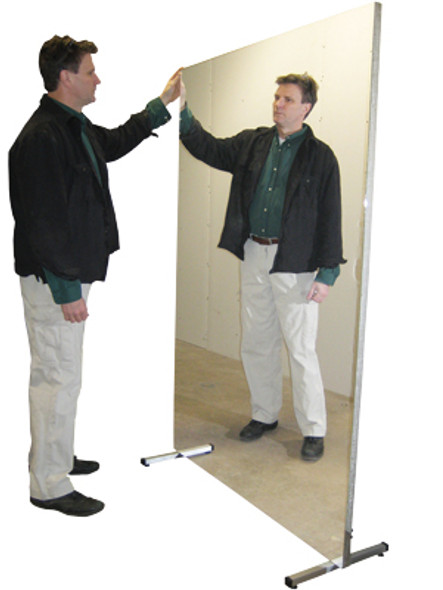
Glassless mirror, stationary with stand, vertical, 36" W x 72" H
FEI
$820.00Ultra-Safe glassless mirrors provide a distortion-free image with its highly optical reflective film. The film is lighter and brighter than glass mirrors and are a perfect glass alternative. These ?glassless? mirrors are shatterproof and are light in...19-1006$820.00 -

Glassless mirror, stationary with stand, vertical, 24" W x 96" H
FEI
$687.50Ultra-Safe glassless mirrors provide a distortion-free image with its highly optical reflective film. The film is lighter and brighter than glass mirrors and are a perfect glass alternative. These ?glassless? mirrors are shatterproof and are light in...19-1005$687.50 -

Glassless mirror, stationary with stand, vertical, 24" W x 72" H
FEI
$627.50Ultra-Safe glassless mirrors provide a distortion-free image with its highly optical reflective film. The film is lighter and brighter than glass mirrors and are a perfect glass alternative. These ?glassless? mirrors are shatterproof and are light in...19-1004$627.50 -

Glassless mirror, stationary with stand, horizontal, 72" W x 36" H
FEI
$755.00Ultra-Safe glassless mirrors provide a distortion-free image with its highly optical reflective film. The film is lighter and brighter than glass mirrors and are a perfect glass alternative. These ?glassless? mirrors are shatterproof and are light in...19-1003$755.00 -

Glassless mirror, stationary with stand, vertical, 16" W x 48" H
FEI
$475.00Ultra-Safe glassless mirrors provide a distortion-free image with its highly optical reflective film. The film is lighter and brighter than glass mirrors and are a perfect glass alternative. These ?glassless? mirrors are shatterproof and are light in...19-1002$475.00 -

Gooseneck exam lamp, mobile base, 3-prong plug
Generic
$232.5016" flexible goose neck arm adjust 360. Goose neck style allows the lamp to be adjusted in any direction. Adjustable height (48" to 72"). UL Listed, for use with incandescent light bulbs up to 60 watts.17-1121$232.50 -

Gooseneck exam lamp, stationary base, 3-prong plug
Generic
$212.5016" flexible goose neck arm adjust 360. Goose neck style allows the lamp to be adjusted in any direction. Adjustable height (48" to 72"). UL Listed, for use with incandescent light bulbs up to 60 watts.17-1101$212.50 -
Out of stock

Hip-high Chair 24" W x 41" H x 23.5" Depth
Generic
$675.00Square armrests make sitting down and getting up safe and easy. Soft, comfortable and water-resistant vinyl seat cover. Adjustable foot rest. Attractive solid maple construction. 300 pound capacity. 26" floor to seat, 24" width, 41" height, 23.5" depth.16-1800$675.00 -

Foot stool, with hand rail
CanDo
$110.00Non-skid ribbed rubber platform with reinforced rubber tips, steel welded silver vein construction, 11" L x 14" W x 9" H, 300 lb weight capacity.16-1710$110.00 -

Foot stool, standard, 2-pack
CanDo
$125.00Non-skid ribbed rubber platform with reinforced rubber tips, steel welded silver vein construction, 11" L x 14" W x 9" H, 300 lb weight capacity.16-1701-2$125.00 -

Foot stool, standard
CanDo
$67.50Non-skid ribbed rubber platform with reinforced rubber tips, steel welded silver vein construction, 11" L x 14" W x 9" H, 300 lb weight capacity.16-1701$67.50 -

Mobile stool, no back, square top, 18" H, gray upholstery
CanDo
$190.003" padded seat. 18" fixed height. 250 pound weight capacity. With 2" hooded carpet caster.16-1602$190.00 -

Stationary stool, no back, square top, 18" H, specify upholstery color
CanDo
$207.503" padded seat. 18" fixed height. 250 pound weight capacity. Upholstery color options available.16-1601$207.50 -

Mobile stool, no back, square top, 18" H, specify upholstery color
CanDo
$222.503" padded seat. 18" fixed height. 250 pound weight capacity. With 2" hooded carpet caster. Upholstery color options available.16-1600$222.50 -

Mechanical mobile stool, no back, 18" - 24" H, black upholstery
CanDo
$232.50Height adjustable (18"-24") "screw-type" revolving stool with round footrest. 2" hooded carpet casters. 14" diameter, 4" thick padded seat. 250 pound weight capacity.16-1102$232.50 -

Mechanical mobile stool, no back, 18" - 24" H, specify upholstery color
CanDo
$230.00Height adjustable (18"-24") "screw-type" revolving stool with round footrest. 2" hooded carpet casters. 14" diameter, 4" thick padded seat. 250 pound weight capacity. Upholstery color options available.16-1100$230.00 -

CanDo Weight and Mirror Rack with accessories (Cuff Weights, 50yd band set, dumbbells)
CanDo
$1,900.00The CanDo Weight and Mirror Rack can hold up to 48 cuff weights, 22 dumbbells, 6 rolls of exercise band and/or tubing and more. The strong polycarbonate dumbbell rods are found on the sides of the mobile rack and are angled for added stability. The white...15-4255$1,900.00 -

CanDo Adjustable Balance Platform
CanDo
$840.00The CanDo Adjustable Balance Platform feature adjustable platform mounted handrails on a rugged indoor/outdoor carpet. The stainless-steel handrails can easily change in height with spring-loaded plungers. End bumpers are found on the handrails for added...15-4254$840.00 -

CanDo Hi-Lo Mat Platform with Upholstered Top, 6' x 8'
CanDo
$5,800.00The CanDo Hi-Lo Mat Platform with Upholstered Top is a heavy duty, upholstered mat platform with an ultra-strong, uni-frame base. It features a 110-volt electric powered height adjustment with hands-free low voltage foot control. This heavy duty, all...15-4253$5,800.00 -

CanDo Hi-Lo Mat Platform with Upholstered Top, 5' x 7'
CanDo
$5,300.00The CanDo Hi-Lo Mat Platform with Upholstered Top is a heavy duty, upholstered mat platform with an ultra-strong, uni-frame base. It features a 110-volt electric powered height adjustment with hands-free low voltage foot control. This heavy duty, all...15-4252$5,300.00 -

CanDo Hi-Lo Mat Platform with Upholstered Top, 4' x 7'
CanDo
$5,025.00The CanDo Hi-Lo Mat Platform with Upholstered Top is a heavy duty, upholstered mat platform with an ultra-strong, uni-frame base. It features a 110-volt electric powered height adjustment with hands-free low voltage foot control. This heavy duty, all...15-4251$5,025.00 -

CanDo Treatment Table w/Flat Top and Shelf, 400 LB Capacity, 72"L x 30"W x 31"H
CanDo
$745.00The CanDo Treatment Table w/Flat Top and Shelf is a fast to assemble treatment table with basic tools for an easier assembly. It features a fully laminated shelf and pre-inserted carriage bolts in the solid hardwood legs for convenience. The topcoat...15-4250$745.00 -

CanDo Treatment Table w/Flat Top and Shelf, 400 LB Capacity, 72"L x 27"W x 31"H
CanDo
$720.00The CanDo Treatment Table w/Flat Top and Shelf is a fast to assemble treatment table with basic tools for an easier assembly. It features a fully laminated shelf and pre-inserted carriage bolts in the solid hardwood legs for convenience. The topcoat...15-4249$720.00 -

CanDo Treatment Table H-Brace w/Flat Top, 400 LB Capacity, 72"L x 30"W x 31"H
CanDo
$620.00The CanDo Treatment Table H-Brace w/Flat Top is a fast to assemble treatment table with basic tools for an easier assembly. It features an H-brace construction and pre-inserted carriage bolts in the solid hardwood legs for convenience. The topcoat finish...15-4248$620.00 -

CanDo Treatment Table H-Brace w/Flat Top, 400 LB Capacity, 72"L x 27"W x 31"H
CanDo
$600.00The CanDo Treatment Table H-Brace w/Flat Top is a fast to assemble treatment table with basic tools for an easier assembly. It features an H-brace construction and pre-inserted carriage bolts in the solid hardwood legs for convenience. The topcoat finish...15-4247$600.00 -

CanDo Treatment Table w/ Adjustable Back, 400 LB Capacity, 72"L x 30"W x 31"H
CanDo
$630.00The CanDo Treatment Table w/ Adjustable Back is a fast and easy to assemble treatment table with a scratch resistant topcoat finish. It features hardwood legs and an adjustable backrest for better positioning. The topcoat finish is made of a heavyweight,...15-4246$630.00 -

CanDo Treatment Table w/ Adjustable Back, 400 LB Capacity, 72"L x 27"W x 31"H
CanDo
$605.00The CanDo Treatment Table w/ Adjustable Back is a fast and easy to assemble treatment table with a scratch resistant topcoat finish. It features hardwood legs and an adjustable backrest for better positioning. The topcoat finish is made of a heavyweight,...15-4245$605.00 -

CanDo Floor Mounted Parallel Bars, Height & Width Adjustable, 12'
CanDo
$1,250.00The CanDo Floor Mounted Parallel Bars feature parallel bars and uprights that mount directly to the floor. The stainless-steel handrails can easily change in height with spring-loaded plungers and numbered height indicator strips. End bumpers are found...15-4244$1,250.00